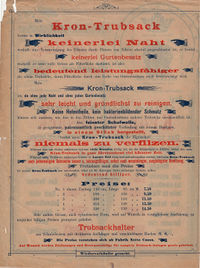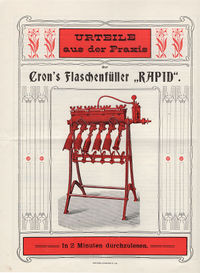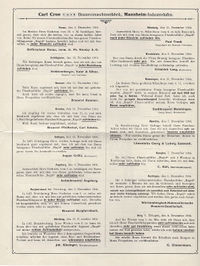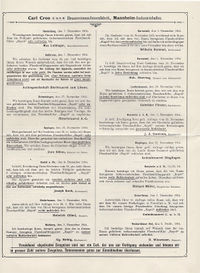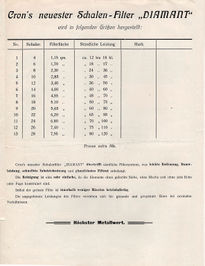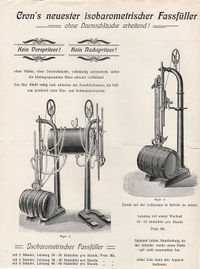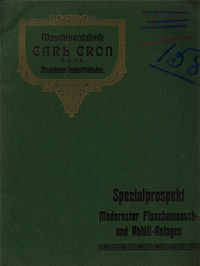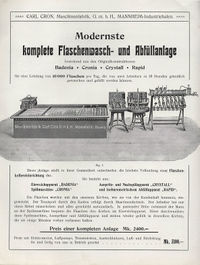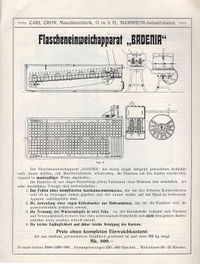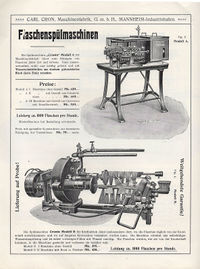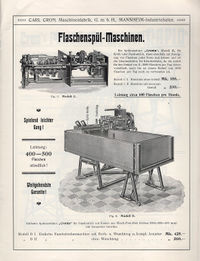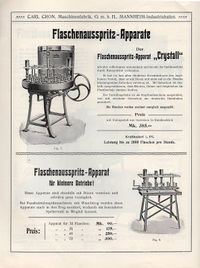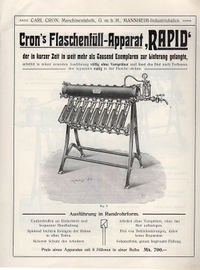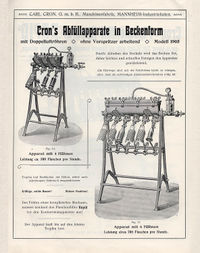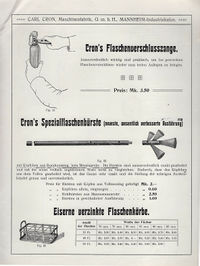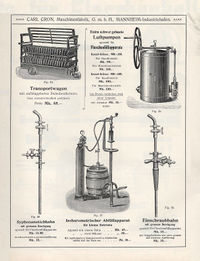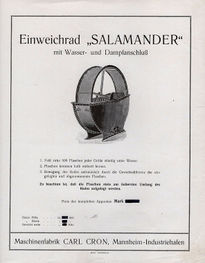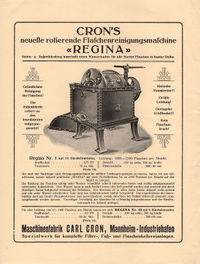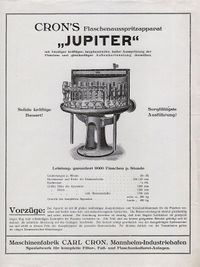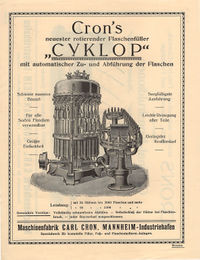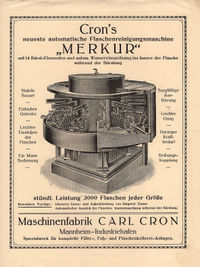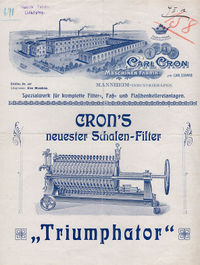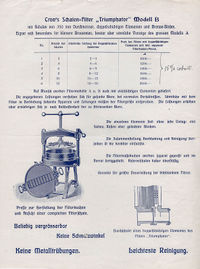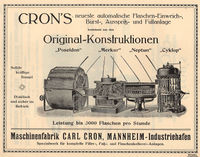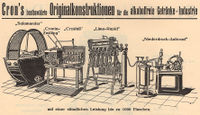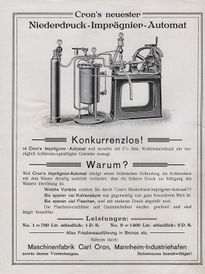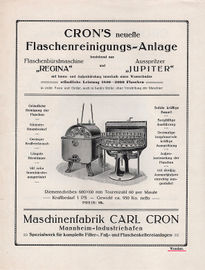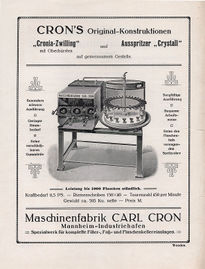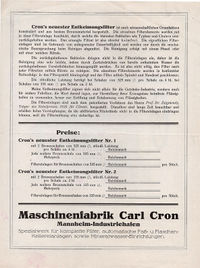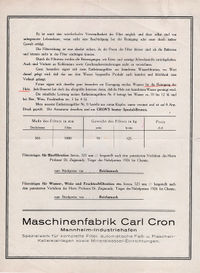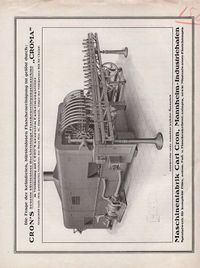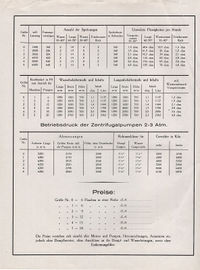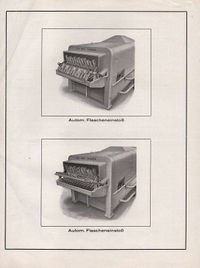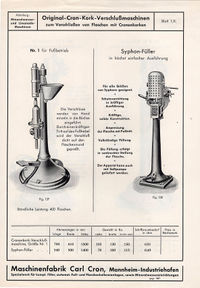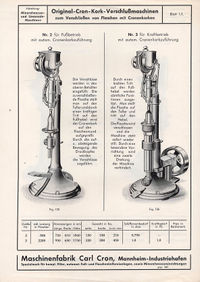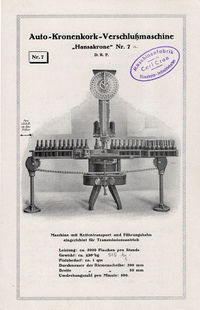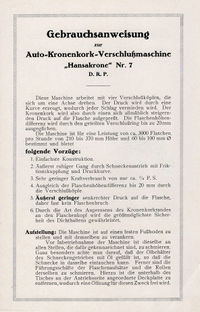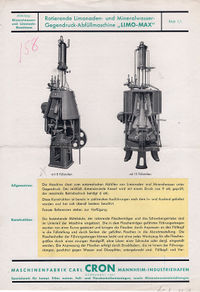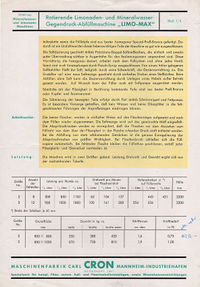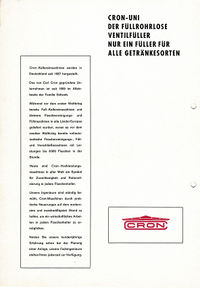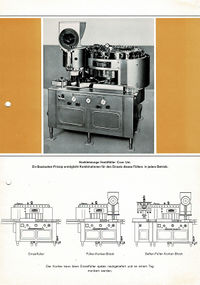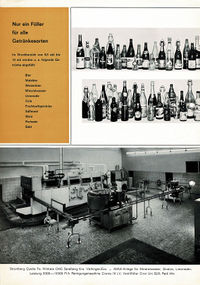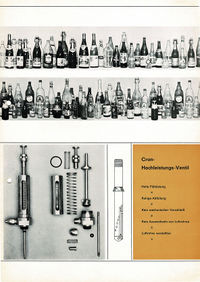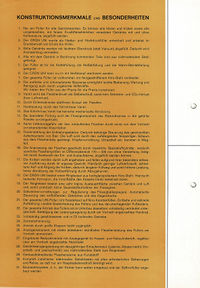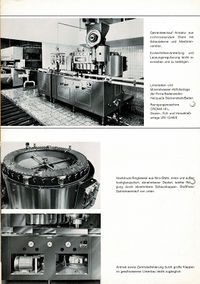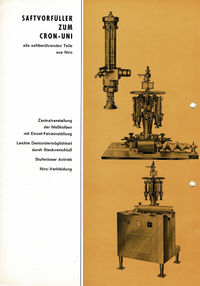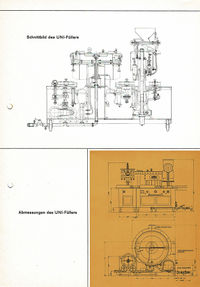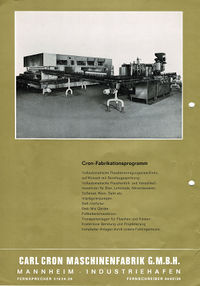Informationen zu Cron, Carl: Unterschied zwischen den Versionen
Rb (Diskussion | Beiträge) |
Rb (Diskussion | Beiträge) |
||
| (35 dazwischenliegende Versionen desselben Benutzers werden nicht angezeigt) | |||
| Zeile 1: | Zeile 1: | ||
| − | + | '''1867''' Gründung.<br> | |
| + | Die Liegenschaft Vater Rhein fand Ursprung in ihrer Erschließung durch den Unternehmersohn und Fabrikanten Carl Georg Schwab im Jahr '''1908'''. Der ideenreiche Unternehmer war im Besitz von Patenten für Spritzdüsen, welche eine produktive Abfüllung von Flüssigkeiten in Behälter erlaubten. | ||
| − | + | '''1908''' erwarb Carl Schwab die Gesellschaftsanteile der Firma Carl Cron Mannheim von dem Mannheimer Kaufmann Carl Winterwerb. Cron war zu dieser Zeit ein Maschinenbauunternehmen, welches sich auf die Herstellung von Filter- und Kellereianlagen spezialisiert hatte. | |
| − | + | ||
| − | + | ||
Mit Hilfe seiner Patente baute Carl Schwab das Unternehmen zu einem Spezialhersteller für Fass- und Mineralwasserabfüllanlagen aus, wurde deutscher Marktführer und erwarb internationale Reputation. Die Erfindung einen einzigartigen Verschlusssystemes durch einen Blechdeckel, des auf nahezu sämtlichen Erfrischungsgetränken noch heute verwendeten "Cronenkorken",ging buchstäblich auf Carl Schwabs Konto. | Mit Hilfe seiner Patente baute Carl Schwab das Unternehmen zu einem Spezialhersteller für Fass- und Mineralwasserabfüllanlagen aus, wurde deutscher Marktführer und erwarb internationale Reputation. Die Erfindung einen einzigartigen Verschlusssystemes durch einen Blechdeckel, des auf nahezu sämtlichen Erfrischungsgetränken noch heute verwendeten "Cronenkorken",ging buchstäblich auf Carl Schwabs Konto. | ||
(Anmerkung RB: dürfte wohl übertrieben sein; s. "Crown"). | (Anmerkung RB: dürfte wohl übertrieben sein; s. "Crown"). | ||
| − | 1926 wurde sein Bruder Albert Philipp, Diplom-Ingenieur, Teilhaber im Betrieb. Die Kriegszeiten brachten durch kriegsbedingte Pfändungen von Aktivas und der Rekrutierung der Belegschaft den Betrieb zur Stillegung. Erst 1948 konnte die Produktion wieder aufgenommen werden. | + | '''1926''' wurde sein Bruder Albert Philipp, Diplom-Ingenieur, Teilhaber im Betrieb. Die Kriegszeiten brachten durch kriegsbedingte Pfändungen von Aktivas und der Rekrutierung der Belegschaft den Betrieb zur Stillegung. Erst '''1948''' konnte die Produktion wieder aufgenommen werden. |
| − | Die Kapazitäten wurden während der deutschen Wirtschaftswunderjahre stark ausgebaut. Es entstanden nacheinander das Bürohaus an der Hombuschstrasse, der Speisesaal (Hombuschstrasse EG), Sozialräume (Mezzanine), das Wohnhaus Scheidthorststrasse (damals noch Hemshofstrasse), sowie das Metallager (Halle Süd). Im Bürohaus Friesenheimer Strasse 2.OG, als auch im Wohnhaus Scheidthorststrasse 1.OG entstanden exklusive, grossflächige Wohnungen für die Schwab-Brüder. | + | Die Kapazitäten wurden während der deutschen Wirtschaftswunderjahre stark ausgebaut. Es entstanden nacheinander das Bürohaus an der Hombuschstrasse, der Speisesaal (Hombuschstrasse EG), Sozialräume (Mezzanine), das Wohnhaus Scheidthorststrasse (damals noch Hemshofstrasse), sowie das Metallager (Halle Süd). Im Bürohaus Friesenheimer Strasse 2.OG, als auch im Wohnhaus Scheidthorststrasse 1.OG entstanden exklusive, grossflächige Wohnungen für die Schwab-Brüder.<br> |
| + | '''1963''' | ||
| + | Cron wird in Italien vertreten durch Prot, Milano. Quelle: Katalog 1. Simei, Milano.<br> | ||
| + | '''1972'''<br> | ||
Der Versuch einer internationalen Expansion scheiterte und endete in der Insolvenz 1972. | Der Versuch einer internationalen Expansion scheiterte und endete in der Insolvenz 1972. | ||
Aufgrund einer Ausfallbürgschaft wurde die Stadt Mannheim Eigentümerin der Liegenschaft. Die neue Nutzung bestand in einem Konzept der teilweisen Fremdvermietung und Eigennutzung. So wurde das Bürohaus Friesenheimer Strasse und Freiflächen an eine Brühler Spedition, die Halle West an das Reismuseum, die Halle Ost an die Verkehrsbetriebe, die Halle Süd an die Stadtreklame und die Mezzanine an das Spielmobil Mannheim vermietet. | Aufgrund einer Ausfallbürgschaft wurde die Stadt Mannheim Eigentümerin der Liegenschaft. Die neue Nutzung bestand in einem Konzept der teilweisen Fremdvermietung und Eigennutzung. So wurde das Bürohaus Friesenheimer Strasse und Freiflächen an eine Brühler Spedition, die Halle West an das Reismuseum, die Halle Ost an die Verkehrsbetriebe, die Halle Süd an die Stadtreklame und die Mezzanine an das Spielmobil Mannheim vermietet. | ||
| − | 1983 wurde die ehemalige Wohnung von Albert Philipp Schwab in der Scheidthorststrasse dem Künstler Prof. Dr. Mo Edoga als Atelier überlassen. Der Beuys-Schüler errichtete in den Folgejahren in reiner Eigenleistung einen ca. 25 Meter hohen Turm, bestehend aus Schwemmholz von Rhein und Neckar, welchen er"Vater Rhein und Mutter Neckar" taufte. Das erstaunliche dieser Konstruktion ist die federnde Lagerung zwischen den einzelnen Holzbalken: die Teile sind weder verschraubt, noch genagelt, sondern werden nur durch Kunststoffbänder gehalten. Mit dieser Plastik gelangte Prof. Edoga zu nationaler Bekannheit, vertrat Mannheim auf der Dokumenta und gab der Liegenschaft seinen Namen. Eine Kopie des Werkes mit nahezu gleichen Ausmassen steht in New York. | + | '''1983''' wurde die ehemalige Wohnung von Albert Philipp Schwab in der Scheidthorststrasse dem Künstler Prof. Dr. Mo Edoga als Atelier überlassen. Der Beuys-Schüler errichtete in den Folgejahren in reiner Eigenleistung einen ca. 25 Meter hohen Turm, bestehend aus Schwemmholz von Rhein und Neckar, welchen er"Vater Rhein und Mutter Neckar" taufte. Das erstaunliche dieser Konstruktion ist die federnde Lagerung zwischen den einzelnen Holzbalken: die Teile sind weder verschraubt, noch genagelt, sondern werden nur durch Kunststoffbänder gehalten. Mit dieser Plastik gelangte Prof. Edoga zu nationaler Bekannheit, vertrat Mannheim auf der Dokumenta und gab der Liegenschaft seinen Namen. Eine Kopie des Werkes mit nahezu gleichen Ausmassen steht in New York. |
| − | Im Jahre 1997 wurde die Liegenschaft von den Brüdern Martin und Thomas Köhler übernommen und saniert. | + | Im Jahre '''1997''' wurde die Liegenschaft von den Brüdern Martin und Thomas Köhler übernommen und saniert. |
Quelle: www.vater-rhein-haus.de | Quelle: www.vater-rhein-haus.de | ||
| + | In den''' 1960er'''-Jahren war Ing. Würfel leitender Ingenieur der Firma.Von einem USA-Aufenthalt brachte er die Idee eines Premixers mit, den er unter dem Namen MATEK entwickelte neben der Weiterentwicklung der Flaschenreinigungsmaschine CROMA. Nach der Insolvenz 1972 machte sich Würfel selbständig unter dem Namen WUEMA (siehe dort). Quelle: Manfred Kitzinger. | ||
| − | '''1904 | + | '''1894 Kron Trubsack''' |
| + | {| class="galleryTable noFloat" | ||
| + | |- | ||
| + | | [[File:1894_Cron_Trubsack1.jpg|200px|thumb|left|Seite 1]] | ||
| + | | [[File:1894_Cron_Trubsack2.jpg|200px|thumb|left|Seite 2]] | ||
| + | |} | ||
| + | '''1904 Annonce''' | ||
{| class="galleryTable noFloat" | {| class="galleryTable noFloat" | ||
|- | |- | ||
| [[File:Fromme Anzeige1 1904.jpg|200px|thumb|left|Annonce Seite 1]] | | [[File:Fromme Anzeige1 1904.jpg|200px|thumb|left|Annonce Seite 1]] | ||
| − | |||
|} | |} | ||
'''1904 Referenzliste "Rapid"''' | '''1904 Referenzliste "Rapid"''' | ||
| Zeile 41: | Zeile 49: | ||
| [[File:1905_ca._Cron_Schalenfilter1.jpg|200px|thumb|left|Seite 1]] | | [[File:1905_ca._Cron_Schalenfilter1.jpg|200px|thumb|left|Seite 1]] | ||
| [[File:1905_ca._Cron_Schalenfilter2.jpg|205px|thumb|left|Seite 2]] | | [[File:1905_ca._Cron_Schalenfilter2.jpg|205px|thumb|left|Seite 2]] | ||
| − | | [[File:1905_ca._Cron_Schalenfilter3.jpg| | + | | [[File:1905_ca._Cron_Schalenfilter3.jpg|200px|thumb|left|Seite 3]] |
| [[File:1905_ca._Cron_Schalenfilter4.jpg|200px|thumb|left|Seite 4]] | | [[File:1905_ca._Cron_Schalenfilter4.jpg|200px|thumb|left|Seite 4]] | ||
|} | |} | ||
| Zeile 73: | Zeile 81: | ||
| [[File:1905_Cron_Katalog12.jpg|200px|thumb|left|Seite 12]] | | [[File:1905_Cron_Katalog12.jpg|200px|thumb|left|Seite 12]] | ||
| [[File:1905_Cron_Katalog99.jpg|200px|thumb|left|Deckel hinten]] | | [[File:1905_Cron_Katalog99.jpg|200px|thumb|left|Deckel hinten]] | ||
| + | |} | ||
| + | |||
| + | '''1905 ca_Cron_Cronia_Zwilling, Einweichrad, Regina''' | ||
| + | {| class="galleryTable noFloat" | ||
| + | |- | ||
| + | | [[File:1905_Cron_Cronia_Zwilling.jpg|200px|thumb|left|Seite 1]] | ||
| + | | [[File:1905_Cron_Salamander.jpg|205px|thumb|left|Seite 1]] | ||
| + | | [[File:1905_Cron_Regina.jpg|200px|thumb|left|Seite 1]] | ||
| + | |} | ||
| + | '''1910 ca_Cron_Neptun und Jupiter''' | ||
| + | {| class="galleryTable noFloat" | ||
| + | |- | ||
| + | | [[File:1905_Cron_Neptun.jpg|200px|thumb|left|Seite 1]] | ||
| + | | [[File:1905_Cron_Jupiter.jpg|200px|thumb|left|Seite 1]] | ||
| + | |} | ||
| + | '''1911 ca_Cron_Cyclop und Merkur''' | ||
| + | {| class="galleryTable noFloat" | ||
| + | |- | ||
| + | | [[File:1920_ca_Cron_Cyclop.jpg|200px|thumb|left|Seite 1]] | ||
| + | | [[File:1920_ca_Cron_Merkur.jpg|200px|thumb|left|Seite 1]] | ||
| + | |} | ||
| + | '''1912 Cron's neuester Schalen-Filter''' | ||
| + | {| class="galleryTable noFloat" | ||
| + | |- | ||
| + | | [[File:1912_Cron_Triumphator1.jpg|200px|thumb|left|Seite 1]] | ||
| + | | [[File:1912_Cron_Triumphator2.jpg|200px|thumb|left|Seite 2]] | ||
| + | | [[File:1912_Cron_Triumphator3.jpg|200px|thumb|left|Seite 3]] | ||
| + | | [[File:1912_Cron_Triumphator4.jpg|200px|thumb|left|Seite 4]] | ||
| + | |} | ||
| + | '''1920 ca_Cron_Originalkonstruktionen''' | ||
| + | {| class="galleryTable noFloat" | ||
| + | |- | ||
| + | | [[File:1920_ca_Cron_Originalkonstruktionen.jpg|200px|thumb|left|Seite 1]] | ||
| + | | [[File:1920_ca_Cron_Originalkonstruktionen1.jpg|200px|thumb|left|Seite 1]] | ||
| + | |} | ||
| + | '''1920 ca Sammelprospekt und Niederdruck-Imprägnier-Automat''' | ||
| + | {| class="galleryTable noFloat" | ||
| + | |- | ||
| + | | [[File:Cron Prospekt1.jpg|205px|thumb|left|Prospekt von ca. 1920]] | ||
| + | | [[File:1920_ca_Cron_Niederdruck_Impraegnier_Automat.jpg|205px|thumb|left|Prospekt von ca. 1920]] | ||
| + | |} | ||
| + | '''1920 ca Cron_Flaschenreinigungs-Anlage''' | ||
| + | {| class="galleryTable noFloat" | ||
| + | |- | ||
| + | | [[File:1920_ca_Cron_Flaschenreinigungs_Anlage1.jpg|205px|thumb|left|Prospekt Seite 1]] | ||
| + | | [[File:1920_ca_Cron_Flaschenreinigungs_Anlage2.jpg|205px|thumb|left|Prospekt Seite 2]] | ||
|} | |} | ||
'''1927 Annonce''' | '''1927 Annonce''' | ||
| Zeile 78: | Zeile 132: | ||
|- | |- | ||
| [[File:1927_Cron.jpg|200px|thumb|left|Annonce 1927 im "Handbuch...."]] | | [[File:1927_Cron.jpg|200px|thumb|left|Annonce 1927 im "Handbuch...."]] | ||
| + | |} | ||
| + | '''1928_Ca_Cron_Entkeimungsfilter''' | ||
| + | {| class="galleryTable noFloat" | ||
| + | |- | ||
| + | | [[File:1928_ca_Cron_Entkeimungsfilter1.jpg|200px|thumb|left|Seite 1]] | ||
| + | | [[File:1928_ca_Cron_Entkeimungsfilter2.jpg|200px|thumb|left|Seite 1]] | ||
| + | |} | ||
| + | '''1928_Ca_Cron_Entkeimungsfilter No. 0''' | ||
| + | {| class="galleryTable noFloat" | ||
| + | |- | ||
| + | | [[File:1928_ca_Cron_Entkeimungsfilter_0_1.jpg|200px|thumb|left|Seite 1]] | ||
| + | | [[File:1928_ca_Cron_Entkeimungsfilter_0_2.jpg|200px|thumb|left|Seite 2]] | ||
| + | |} | ||
| + | '''1928_Ca_Cron_Croma''' | ||
| + | {| class="galleryTable noFloat" | ||
| + | |- | ||
| + | | [[File:1928_ca_Cron_Croma1.jpg|200px|thumb|left|Seite 1]] | ||
| + | | [[File:1928_ca_Cron_Croma2.jpg|200px|thumb|left|Seite 2]] | ||
| + | | [[File:1928_ca_Cron_Croma3.jpg|200px|thumb|left|Seite 3]] | ||
| + | | [[File:1928_ca_Cron_Croma4.jpg|200px|thumb|left|Seite 4]] | ||
| + | |} | ||
| + | '''1928_Ca_Cron_Original Cron-Kork-Verschlussmaschinen'''<br> | ||
| + | Die hier präsentierten Verschliesser sind Erzeugnisse der Crown Cork Comp.<br> | ||
| + | Cron kokettierte mit dem Namen und brachte sich in den nicht existierenden<br> | ||
| + | Zusammenhang mit der Entwicklung von Kronkorken.<br> | ||
| + | {| class="galleryTable noFloat" | ||
| + | |- | ||
| + | | [[File:1928_ca_Cron_Kronenkorker1.jpg|200px|thumb|left|Seite 1]] | ||
| + | | [[File:1928_ca_Cron_Kronenkorker2.jpg|200px|thumb|left|Seite 2]] | ||
| + | |} | ||
| + | '''1928 ca.Cron-Hansakrone No. 7'''<br> | ||
| + | Auch diese Maschine ist wohl keine Entwicklung von Cron. (O+H?)<br> | ||
| + | {| class="galleryTable noFloat" | ||
| + | |- | ||
| + | | [[File:1928_ca_Cron_Hansakrone1.jpg|200px|thumb|left|Seite 1]] | ||
| + | | [[File:1928_ca_Cron_Hansakrone2.jpg|200px|thumb|left|Seite 2]] | ||
| + | |} | ||
| + | '''1928 ca.Sonderkatalog für complette Flaschenkellereianlagen sowie Mineralwasser-Einrichtungen'''<br> | ||
| + | {| class="galleryTable noFloat" | ||
| + | |- | ||
| + | | [[File:1928_ca_Cron_Katalog00.jpg|200px|thumb|left|Deckel]] | ||
| + | | [[File:1928_ca_Cron_Katalog01.jpg|200px|thumb|left|Seite 1]] | ||
| + | | [[File:1928_ca_Cron_Katalog00_1.jpg|200px|thumb|left|Einlegeprospekt Seite 1]] | ||
| + | | [[File:1928_ca_Cron_Katalog00_1a.jpg|205px|thumb|left|Einlegeprospekt Seite 2]] | ||
| + | |} | ||
| + | {| class="galleryTable noFloat" | ||
| + | |- | ||
| + | | [[File:1928_ca_Cron_Katalog02.jpg|200px|thumb|left|Seite 2]] | ||
| + | | [[File:1928_ca_Cron_Katalog03.jpg|200px|thumb|left|Seite 3]] | ||
| + | | [[File:1928_ca_Cron_Katalog04.jpg|200px|thumb|left|Seite 4]] | ||
| + | | [[File:1928_ca_Cron_Katalog05.jpg|200px|thumb|left|Seite 5]] | ||
| + | |} | ||
| + | {| class="galleryTable noFloat" | ||
| + | |- | ||
| + | | [[File:1928_ca_Cron_Katalog06.jpg|200px|thumb|left|Seite 6]] | ||
| + | | [[File:1928_ca_Cron_Katalog07.jpg|200px|thumb|left|Seite 7]] | ||
| + | | [[File:1928_ca_Cron_Katalog08.jpg|200px|thumb|left|Seite 8]] | ||
| + | | [[File:1928_ca_Cron_Katalog09.jpg|200px|thumb|left|Seite 9]] | ||
| + | |} | ||
| + | {| class="galleryTable noFloat" | ||
| + | |- | ||
| + | | [[File:1928_ca_Cron_Katalog10.jpg|200px|thumb|left|Seite 10]] | ||
| + | | [[File:1928_ca_Cron_Katalog11.jpg|200px|thumb|left|Seite 11]] | ||
| + | | [[File:1928_ca_Cron_Katalog12.jpg|200px|thumb|left|Seite 12]] | ||
| + | | [[File:1928_ca_Cron_Katalog13.jpg|200px|thumb|left|Seite 13]] | ||
| + | |} | ||
| + | {| class="galleryTable noFloat" | ||
| + | |- | ||
| + | | [[File:1928_ca_Cron_Katalog14.jpg|200px|thumb|left|Seite 14]] | ||
| + | | [[File:1928_ca_Cron_Katalog15.jpg|200px|thumb|left|Seite 15]] | ||
| + | | [[File:1928_ca_Cron_Katalog16.jpg|200px|thumb|left|Seite 16]] | ||
| + | | [[File:1928_ca_Cron_Katalog17.jpg|200px|thumb|left|Seite 17]] | ||
| + | |} | ||
| + | {| class="galleryTable noFloat" | ||
| + | |- | ||
| + | | [[File:1928_ca_Cron_Katalog18.jpg|200px|thumb|left|Seite 18]] | ||
| + | | [[File:1928_ca_Cron_Katalog19.jpg|200px|thumb|left|Seite 19]] | ||
| + | | [[File:1928_ca_Cron_Katalog20.jpg|200px|thumb|left|Seite 20]] | ||
| + | | [[File:1928_ca_Cron_Katalog21.jpg|200px|thumb|left|Seite 21]] | ||
| + | |} | ||
| + | {| class="galleryTable noFloat" | ||
| + | |- | ||
| + | | [[File:1928_ca_Cron_Katalog22.jpg|200px|thumb|left|Seite 22]] | ||
| + | | [[File:1928_ca_Cron_Katalog23.jpg|200px|thumb|left|Seite 23]] | ||
| + | | [[File:1928_ca_Cron_Katalog24.jpg|200px|thumb|left|Seite 24]] | ||
| + | | [[File:1928_ca_Cron_Katalog25.jpg|200px|thumb|left|Seite 25]] | ||
| + | |} | ||
| + | {| class="galleryTable noFloat" | ||
| + | |- | ||
| + | | [[File:1928_ca_Cron_Katalog26.jpg|200px|thumb|left|Seite 26]] | ||
| + | | [[File:1928_ca_Cron_Katalog27.jpg|200px|thumb|left|Seite 27]] | ||
| + | | [[File:1928_ca_Cron_Katalog28.jpg|200px|thumb|left|Seite 28]] | ||
| + | | [[File:1928_ca_Cron_Katalog29.jpg|200px|thumb|left|Seite 29]] | ||
| + | |} | ||
| + | {| class="galleryTable noFloat" | ||
| + | |- | ||
| + | | [[File:1928_ca_Cron_Katalog30.jpg|200px|thumb|left|Seite 30]] | ||
| + | | [[File:1928_ca_Cron_Katalog31.jpg|200px|thumb|left|Seite 31]] | ||
| + | | [[File:1928_ca_Cron_Katalog32.jpg|200px|thumb|left|Seite 32]] | ||
| + | | [[File:1928_ca_Cron_Katalog33.jpg|200px|thumb|left|Seite 33]] | ||
| + | |} | ||
| + | {| class="galleryTable noFloat" | ||
| + | |- | ||
| + | | [[File:1928_ca_Cron_Katalog34.jpg|200px|thumb|left|Seite 34]] | ||
| + | | [[File:1928_ca_Cron_Katalog34a.jpg|200px|thumb|left|Einlegeprospekt Seite 1]] | ||
| + | | [[File:1928_ca_Cron_Katalog34b.jpg|200px|thumb|left|Einlegeprospekt Seite 2]] | ||
| + | | [[File:1928_ca_Cron_Katalog35.jpg|200px|thumb|left|Seite 35]] | ||
| + | |} | ||
| + | {| class="galleryTable noFloat" | ||
| + | |- | ||
| + | | [[File:1928_ca_Cron_Katalog36.jpg|200px|thumb|left|Seite 36]] | ||
| + | | [[File:1928_ca_Cron_Katalog37.jpg|200px|thumb|left|Seite 37]] | ||
| + | | [[File:1928_ca_Cron_Katalog38.jpg|200px|thumb|left|Seite 38]] | ||
| + | | [[File:1928_ca_Cron_Katalog39.jpg|200px|thumb|left|Seite 39]] | ||
| + | |} | ||
| + | {| class="galleryTable noFloat" | ||
| + | |- | ||
| + | | [[File:1928_ca_Cron_Katalog40.jpg|200px|thumb|left|Seite 40]] | ||
| + | | [[File:1928_ca_Cron_Katalog40a.jpg|200px|thumb|left|Einlegeprospekt Seite 1]] | ||
| + | | [[File:1928_ca_Cron_Katalog40b.jpg|200px|thumb|left|Einlegeprospekt Seite 2]] | ||
| + | | [[File:1928_ca_Cron_Katalog41.jpg|200px|thumb|left|Seite 41]] | ||
| + | |} | ||
| + | {| class="galleryTable noFloat" | ||
| + | |- | ||
| + | | [[File:1928_ca_Cron_Katalog42.jpg|200px|thumb|left|Seite 42]] | ||
| + | | [[File:1928_ca_Cron_Katalog42a.jpg|200px|thumb|left|Einlegeprospekt Seite 1]] | ||
| + | | [[File:1928_ca_Cron_Katalog42b.jpg|200px|thumb|left|Einlegeprospekt Seite 2]] | ||
| + | | [[File:1928_ca_Cron_Katalog43.jpg|200px|thumb|left|Seite 43]] | ||
| + | |} | ||
| + | {| class="galleryTable noFloat" | ||
| + | |- | ||
| + | | [[File:1928_ca_Cron_Katalog44.jpg|200px|thumb|left|Seite 44]] | ||
| + | | [[File:1928_ca_Cron_Katalog45.jpg|200px|thumb|left|Seite 45]] | ||
| + | | [[File:1928_ca_Cron_Katalog46.jpg|200px|thumb|left|Seite 46]] | ||
| + | | [[File:1928_ca_Cron_Katalog47.jpg|200px|thumb|left|Seite 47]] | ||
| + | |} | ||
| + | {| class="galleryTable noFloat" | ||
| + | |- | ||
| + | | [[File:1928_ca_Cron_Katalog48.jpg|200px|thumb|left|Seite 48]] | ||
| + | | [[File:1928_ca_Cron_Katalog49.jpg|200px|thumb|left|Seite 49]] | ||
| + | | [[File:1928_ca_Cron_Katalog50.jpg|200px|thumb|left|Seite 50]] | ||
| + | | [[File:1928_ca_Cron_Katalog51.jpg|200px|thumb|left|Seite 51]] | ||
| + | |} | ||
| + | {| class="galleryTable noFloat" | ||
| + | |- | ||
| + | | [[File:1928_ca_Cron_Katalog52.jpg|200px|thumb|left|Seite 52]] | ||
| + | | [[File:1928_ca_Cron_Katalog53.jpg|200px|thumb|left|Seite 53]] | ||
| + | | [[File:1928_ca_Cron_Katalog54.jpg|200px|thumb|left|Seite 54]] | ||
| + | | [[File:1928_ca_Cron_Katalog55.jpg|200px|thumb|left|Seite 55]] | ||
| + | |} | ||
| + | {| class="galleryTable noFloat" | ||
| + | |- | ||
| + | | [[File:1928_ca_Cron_Katalog56.jpg|200px|thumb|left|Seite 56]] | ||
| + | | [[File:1928_ca_Cron_Katalog57.jpg|200px|thumb|left|Seite 57]] | ||
| + | | [[File:1928_ca_Cron_Katalog58.jpg|200px|thumb|left|Seite 58]] | ||
| + | | [[File:1928_ca_Cron_Katalog59.jpg|200px|thumb|left|Seite 59]] | ||
| + | |} | ||
| + | {| class="galleryTable noFloat" | ||
| + | |- | ||
| + | | [[File:1928_ca_Cron_Katalog60.jpg|200px|thumb|left|Seite 60]] | ||
| + | | [[File:1928_ca_Cron_Katalog61.jpg|200px|thumb|left|Seite 61]] | ||
| + | | [[File:1928_ca_Cron_Katalog62.jpg|200px|thumb|left|Seite 62]] | ||
| + | | [[File:1928_ca_Cron_Katalog62a.jpg|200px|thumb|left|Einlegeprospekt Seite 1]] | ||
| + | |} | ||
| + | {| class="galleryTable noFloat" | ||
| + | |- | ||
| + | | [[File:1928_ca_Cron_Katalog62b.jpg|200px|thumb|left|Einlegeprospekt Seite 2]] | ||
| + | | [[File:1928_ca_Cron_Katalog63.jpg|200px|thumb|left|Seite 63]] | ||
| + | | [[File:1928_ca_Cron_Katalog64.jpg|200px|thumb|left|Seite 64]] | ||
| + | | [[File:1928_ca_Cron_Katalog65.jpg|200px|thumb|left|Seite 65]] | ||
| + | |} | ||
| + | {| class="galleryTable noFloat" | ||
| + | |- | ||
| + | | [[File:1928_ca_Cron_Katalog66.jpg|200px|thumb|left|Seite 66]] | ||
| + | | [[File:1928_ca_Cron_Katalog66a.jpg|200px|thumb|left|Einlegeprospekt Seite 1]] | ||
| + | | [[File:1928_ca_Cron_Katalog66b.jpg|200px|thumb|left|Einlegeprospekt Seite 2]] | ||
| + | | [[File:1928_ca_Cron_Katalog67.jpg|200px|thumb|left|Seite 67]] | ||
| + | |} | ||
| + | {| class="galleryTable noFloat" | ||
| + | |- | ||
| + | | [[File:1928_ca_Cron_Katalog68.jpg|200px|thumb|left|Seite 68]] | ||
| + | | [[File:1928_ca_Cron_Katalog68a.jpg|200px|thumb|left|Einlegeprospekt Seite 1]] | ||
| + | | [[File:1928_ca_Cron_Katalog68b.jpg|200px|thumb|left|Einlegeprospekt Seite 1]] | ||
| + | | [[File:1928_ca_Cron_Katalog68c.jpg|200px|thumb|left|Einlegeprospekt Seite 2]] | ||
| + | |} | ||
| + | {| class="galleryTable noFloat" | ||
| + | |- | ||
| + | | [[File:1928_ca_Cron_Katalog69.jpg|200px|thumb|left|Seite 69]] | ||
| + | | [[File:1928_ca_Cron_Katalog70.jpg|200px|thumb|left|Seite 70]] | ||
| + | | [[File:1928_ca_Cron_Katalog70a.jpg|200px|thumb|left|Einlegeprospekt Seite 1]] | ||
| + | | [[File:1928_ca_Cron_Katalog70b.jpg|200px|thumb|left|Einlegeprospekt Seite 2]] | ||
| + | |} | ||
| + | {| class="galleryTable noFloat" | ||
| + | |- | ||
| + | | [[File:1928_ca_Cron_Katalog71.jpg|200px|thumb|left|Seite 71]] | ||
| + | | [[File:1928_ca_Cron_Katalog72.jpg|200px|thumb|left|Seite 72]] | ||
| + | | [[File:1928_ca_Cron_Katalog73.jpg|200px|thumb|left|Seite 73]] | ||
| + | | [[File:1928_ca_Cron_Katalog74.jpg|200px|thumb|left|Seite 74]] | ||
| + | |} | ||
| + | {| class="galleryTable noFloat" | ||
| + | |- | ||
| + | | [[File:1928_ca_Cron_Katalog75.jpg|200px|thumb|left|Seite 75]] | ||
| + | | [[File:1928_ca_Cron_Katalog76.jpg|200px|thumb|left|Seite 76]] | ||
| + | | [[File:1928_ca_Cron_Katalog77.jpg|200px|thumb|left|Seite 77]] | ||
| + | | [[File:1928_ca_Cron_Katalog78.jpg|200px|thumb|left|Seite 78]] | ||
| + | |} | ||
| + | {| class="galleryTable noFloat" | ||
| + | |- | ||
| + | | [[File:1928_ca_Cron_Katalog79.jpg|200px|thumb|left|Seite 79]] | ||
| + | | [[File:1928_ca_Cron_Katalog80.jpg|200px|thumb|left|Seite 80]] | ||
| + | | [[File:1928_ca_Cron_Katalog81.jpg|200px|thumb|left|Seite 81]] | ||
| + | | [[File:1928_ca_Cron_Katalog82.jpg|200px|thumb|left|Seite 82]] | ||
| + | |} | ||
| + | {| class="galleryTable noFloat" | ||
| + | |- | ||
| + | | [[File:1928_ca_Cron_Katalog83.jpg|200px|thumb|left|Seite 83]] | ||
| + | | [[File:1928_ca_Cron_Katalog84.jpg|200px|thumb|left|Seite 84]] | ||
| + | | [[File:1928_ca_Cron_Katalog85.jpg|200px|thumb|left|Seite 51]] | ||
| + | | [[File:1928_ca_Cron_Katalog86.jpg|200px|thumb|left|Seite 86]] | ||
| + | |} | ||
| + | {| class="galleryTable noFloat" | ||
| + | |- | ||
| + | | [[File:1928_ca_Cron_Katalog87.jpg|200px|thumb|left|Seite 87]] | ||
| + | | [[File:1928_ca_Cron_Katalog88.jpg|200px|thumb|left|Seite 88]] | ||
| + | | [[File:1928_ca_Cron_Katalog89.jpg|200px|thumb|left|Seite 59]] | ||
| + | | [[File:1928_ca_Cron_Katalog90.jpg|200px|thumb|left|Seite 90]] | ||
| + | |} | ||
| + | {| class="galleryTable noFloat" | ||
| + | |- | ||
| + | | [[File:1928_ca_Cron_Katalog91.jpg|200px|thumb|left|Seite 91]] | ||
| + | | [[File:1928_ca_Cron_Katalog92.jpg|200px|thumb|left|Seite 92]] | ||
| + | | [[File:1928_ca_Cron_Katalog93.jpg|200px|thumb|left|Seite 93]] | ||
| + | | [[File:1928_ca_Cron_Katalog94.jpg|200px|thumb|left|Seite 94]] | ||
| + | |} | ||
| + | {| class="galleryTable noFloat" | ||
| + | |- | ||
| + | | [[File:1928_ca_Cron_Katalog94a.jpg|200px|thumb|left|Einlegeprospekt Seite 1]] | ||
| + | | [[File:1928_ca_Cron_Katalog94b.jpg|200px|thumb|left|Einlegeprospekt Seite 2]] | ||
| + | | [[File:1928_ca_Cron_Katalog94c.jpg|200px|thumb|left|Einlegeprospekt Seite 1]] | ||
| + | | [[File:1928_ca_Cron_Katalog94c.jpg|200px|thumb|left|Einlegeprospekt Seite 2]] | ||
| + | |} | ||
| + | {| class="galleryTable noFloat" | ||
| + | |- | ||
| + | | [[File:1928_ca_Cron_Katalog95.jpg|200px|thumb|left|Seite 95]] | ||
| + | | [[File:1928_ca_Cron_Katalog99.jpg|200px|thumb|left|Deckel hinten]] | ||
| + | |} | ||
| + | '''1930_Generalvertretung Rust''' | ||
| + | {| class="galleryTable noFloat" | ||
| + | |- | ||
| + | | [[File:1930_Cron_Rust_Brief.jpg|200px|thumb|left|Seite 1]] | ||
| + | |} | ||
| + | '''1951 Cron Limo_Max''' | ||
| + | {| class="galleryTable noFloat" | ||
| + | |- | ||
| + | | [[File:1951_Cron_Limo_Max1.jpg|200px|thumb|left|Seite 1]] | ||
| + | | [[File:1951_Cron_Limo_Max2.jpg|200px|thumb|left|Seite 2]] | ||
| + | |} | ||
| + | '''1965 ca. Cron Farbkarte''' | ||
| + | {| class="galleryTable noFloat" | ||
| + | |- | ||
| + | | [[File:1965_ca_Cron_Farbkarte1.jpg|120px|thumb|left|Seite 1]] | ||
| + | | [[File:1965_ca_Cron_Farbkarte2.jpg|240px|thumb|left|Seite 2]] | ||
| + | |} | ||
| + | '''1965 ca. Cron Uni''' | ||
| + | {| class="galleryTable noFloat" | ||
| + | |- | ||
| + | | [[File:1965_ca_Cron_Uni01.jpg|200px|thumb|left|Seite 1]] | ||
| + | | [[File:1965_ca_Cron_Uni02.jpg|200px|thumb|left|Seite 2]] | ||
| + | | [[File:1965_ca_Cron_Uni03.jpg|200px|thumb|left|Seite 3]] | ||
| + | | [[File:1965_ca_Cron_Uni04.jpg|200px|thumb|left|Seite 4]] | ||
| + | |} | ||
| + | {| class="galleryTable noFloat" | ||
| + | |- | ||
| + | | [[File:1965_ca_Cron_Uni05.jpg|200px|thumb|left|Seite 5]] | ||
| + | | [[File:1965_ca_Cron_Uni06.jpg|200px|thumb|left|Seite 6]] | ||
| + | | [[File:1965_ca_Cron_Uni07.jpg|200px|thumb|left|Seite 7]] | ||
| + | | [[File:1965_ca_Cron_Uni08.jpg|200px|thumb|left|Seite 8]] | ||
| + | |} | ||
| + | {| class="galleryTable noFloat" | ||
| + | |- | ||
| + | | [[File:1965_ca_Cron_Uni09.jpg|200px|thumb|left|Seite 9]] | ||
| + | | [[File:1965_ca_Cron_Uni10.jpg|200px|thumb|left|Seite 10]] | ||
| + | | [[File:1965_ca_Cron_Uni11.jpg|200px|thumb|left|Seite 11]] | ||
| + | | [[File:1965_ca_Cron_Uni12.jpg|200px|thumb|left|Seite 12]] | ||
| + | |} | ||
| + | '''1983 Seitz_Wüma_Service_Cron''' | ||
| + | {| class="galleryTable noFloat" | ||
| + | |- | ||
| + | | [[File:1983_SEITZ-WUEMA-Generalvertretung und SUEMAK-Service.jpg|200px|thumb|left|Seite 1]] | ||
|} | |} | ||
Aktuelle Version vom 20. Oktober 2024, 14:16 Uhr
1867 Gründung.
Die Liegenschaft Vater Rhein fand Ursprung in ihrer Erschließung durch den Unternehmersohn und Fabrikanten Carl Georg Schwab im Jahr 1908. Der ideenreiche Unternehmer war im Besitz von Patenten für Spritzdüsen, welche eine produktive Abfüllung von Flüssigkeiten in Behälter erlaubten.
1908 erwarb Carl Schwab die Gesellschaftsanteile der Firma Carl Cron Mannheim von dem Mannheimer Kaufmann Carl Winterwerb. Cron war zu dieser Zeit ein Maschinenbauunternehmen, welches sich auf die Herstellung von Filter- und Kellereianlagen spezialisiert hatte.
Mit Hilfe seiner Patente baute Carl Schwab das Unternehmen zu einem Spezialhersteller für Fass- und Mineralwasserabfüllanlagen aus, wurde deutscher Marktführer und erwarb internationale Reputation. Die Erfindung einen einzigartigen Verschlusssystemes durch einen Blechdeckel, des auf nahezu sämtlichen Erfrischungsgetränken noch heute verwendeten "Cronenkorken",ging buchstäblich auf Carl Schwabs Konto. (Anmerkung RB: dürfte wohl übertrieben sein; s. "Crown").
1926 wurde sein Bruder Albert Philipp, Diplom-Ingenieur, Teilhaber im Betrieb. Die Kriegszeiten brachten durch kriegsbedingte Pfändungen von Aktivas und der Rekrutierung der Belegschaft den Betrieb zur Stillegung. Erst 1948 konnte die Produktion wieder aufgenommen werden.
Die Kapazitäten wurden während der deutschen Wirtschaftswunderjahre stark ausgebaut. Es entstanden nacheinander das Bürohaus an der Hombuschstrasse, der Speisesaal (Hombuschstrasse EG), Sozialräume (Mezzanine), das Wohnhaus Scheidthorststrasse (damals noch Hemshofstrasse), sowie das Metallager (Halle Süd). Im Bürohaus Friesenheimer Strasse 2.OG, als auch im Wohnhaus Scheidthorststrasse 1.OG entstanden exklusive, grossflächige Wohnungen für die Schwab-Brüder.
1963
Cron wird in Italien vertreten durch Prot, Milano. Quelle: Katalog 1. Simei, Milano.
1972
Der Versuch einer internationalen Expansion scheiterte und endete in der Insolvenz 1972.
Aufgrund einer Ausfallbürgschaft wurde die Stadt Mannheim Eigentümerin der Liegenschaft. Die neue Nutzung bestand in einem Konzept der teilweisen Fremdvermietung und Eigennutzung. So wurde das Bürohaus Friesenheimer Strasse und Freiflächen an eine Brühler Spedition, die Halle West an das Reismuseum, die Halle Ost an die Verkehrsbetriebe, die Halle Süd an die Stadtreklame und die Mezzanine an das Spielmobil Mannheim vermietet.
1983 wurde die ehemalige Wohnung von Albert Philipp Schwab in der Scheidthorststrasse dem Künstler Prof. Dr. Mo Edoga als Atelier überlassen. Der Beuys-Schüler errichtete in den Folgejahren in reiner Eigenleistung einen ca. 25 Meter hohen Turm, bestehend aus Schwemmholz von Rhein und Neckar, welchen er"Vater Rhein und Mutter Neckar" taufte. Das erstaunliche dieser Konstruktion ist die federnde Lagerung zwischen den einzelnen Holzbalken: die Teile sind weder verschraubt, noch genagelt, sondern werden nur durch Kunststoffbänder gehalten. Mit dieser Plastik gelangte Prof. Edoga zu nationaler Bekannheit, vertrat Mannheim auf der Dokumenta und gab der Liegenschaft seinen Namen. Eine Kopie des Werkes mit nahezu gleichen Ausmassen steht in New York.
Im Jahre 1997 wurde die Liegenschaft von den Brüdern Martin und Thomas Köhler übernommen und saniert. Quelle: www.vater-rhein-haus.de
In den 1960er-Jahren war Ing. Würfel leitender Ingenieur der Firma.Von einem USA-Aufenthalt brachte er die Idee eines Premixers mit, den er unter dem Namen MATEK entwickelte neben der Weiterentwicklung der Flaschenreinigungsmaschine CROMA. Nach der Insolvenz 1972 machte sich Würfel selbständig unter dem Namen WUEMA (siehe dort). Quelle: Manfred Kitzinger.
1894 Kron Trubsack
1904 Annonce
1904 Referenzliste "Rapid"
1905 ca. Prospekt Schalenfilter
1905 Spezialprospekt modernster Flaschenwasch- und Abfüllanlagen
1905 ca_Cron_Cronia_Zwilling, Einweichrad, Regina
1910 ca_Cron_Neptun und Jupiter
1911 ca_Cron_Cyclop und Merkur
1912 Cron's neuester Schalen-Filter
1920 ca_Cron_Originalkonstruktionen
1920 ca Sammelprospekt und Niederdruck-Imprägnier-Automat
1920 ca Cron_Flaschenreinigungs-Anlage
1927 Annonce
1928_Ca_Cron_Entkeimungsfilter
1928_Ca_Cron_Entkeimungsfilter No. 0
1928_Ca_Cron_Croma
1928_Ca_Cron_Original Cron-Kork-Verschlussmaschinen
Die hier präsentierten Verschliesser sind Erzeugnisse der Crown Cork Comp.
Cron kokettierte mit dem Namen und brachte sich in den nicht existierenden
Zusammenhang mit der Entwicklung von Kronkorken.
1928 ca.Cron-Hansakrone No. 7
Auch diese Maschine ist wohl keine Entwicklung von Cron. (O+H?)
1928 ca.Sonderkatalog für complette Flaschenkellereianlagen sowie Mineralwasser-Einrichtungen
1930_Generalvertretung Rust
1951 Cron Limo_Max
1965 ca. Cron Farbkarte
1965 ca. Cron Uni
1983 Seitz_Wüma_Service_Cron

